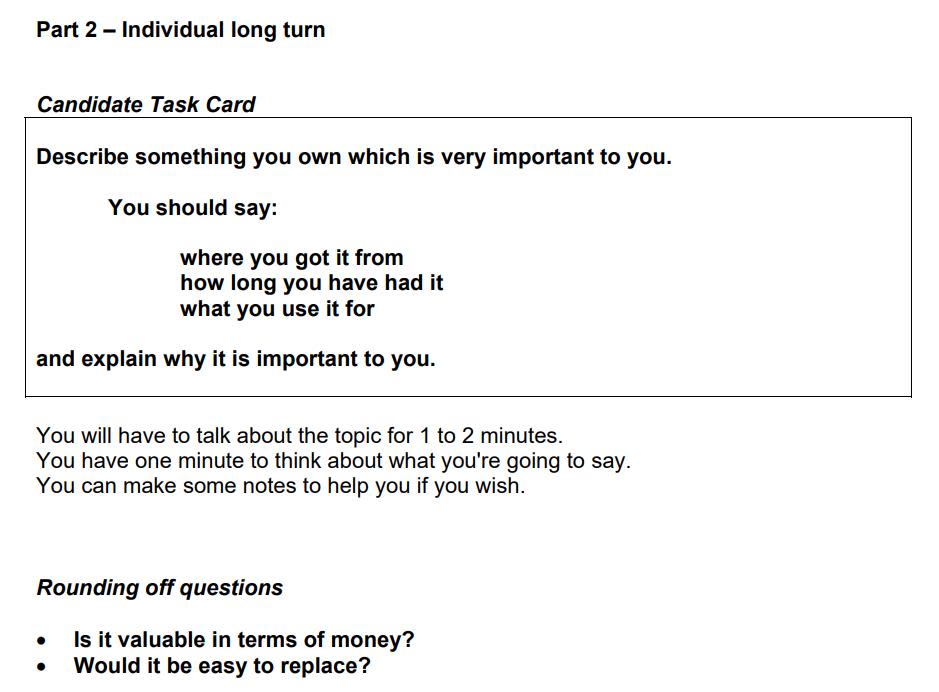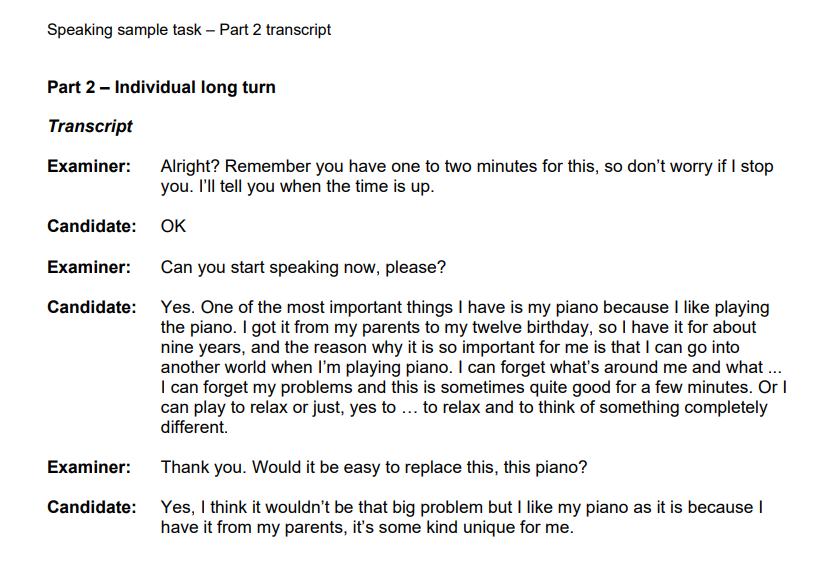Summary: Learn how to approach IELTS cue card questions effectively with expert tips, common topics, and sample answers to help you score higher in IELTS Speaking Part 2.
What are the common IELTS cue card questions and how to answer them in Speaking part 2?
A cue card is part of IELTS Speaking Part 2 where you're asked to speak on a topic for 1–2 minutes. You'll be given a cue card with prompts to guide your response, and one minute to prepare. This segment evaluates your ability to think, structure, and speak fluently and confidently. Also known as IELTS cue card questions, these are crucial to test coherence, vocabulary, and pronunciation.
Get a dream preparation pack for IELTS!
Access 70+ free IELTS mock tests, a lifetime prep bundle, expert sessions, study plan and more.
What is the Format of the IELTS Speaking Test?
The IELTS Speaking test is divided into 3 parts:
Part 1 – Introduction & Interview (4–5 mins): The examiner asks general questions about yourself, such as your home, family, work, or interests.
Part 2 – Individual Long Turn (3–4 mins): You’ll receive a cue card topic and have 1 minute to prepare. You’ll then speak for 1–2 minutes. This is your chance to express opinions, tell stories, and showcase vocabulary.
Part 3 – Two-way Discussion (4–5 mins): Further questions linked to Part 2 are asked, requiring more analytical and in-depth answers.
What are Cue Card topics in IELTS?
Definition of a Cue
Misconception: There is a common misunderstanding that a cue is associated with the letter "q," but in reality, it refers to the word "Cue."
Clarification: In IELTS Speaking Part 2, you will receive a topic to discuss, which is referred to as a cue. This term can also be called a cue card question.
An IELTS cue card question is a specific type of Speaking task in the IELTS exam. In this part of the IELTS Speaking test, candidates are presented with a cue card or topic card that contains a brief description of a particular topic, along with some prompts or questions related to that topic.
Test-takers are then given one minute to prepare and make notes on the topic provided on the cue card. After this brief preparation time, they are required to speak about the topic for about 1 to 2 minutes, addressing the prompts and providing relevant information, opinions, and examples.
The purpose of the IELTS cue card questions is to assess a candidate's ability to speak fluently and coherently on a given subject, as well as to evaluate their language proficiency, vocabulary, and pronunciation.
Example cue card question with answer
Here is an example of a cue card question with an answer for your reference, consider practicing these kinds of questions to score higher in your IELTS Speaking task 2.


List of cue card questions
Here is a list of common topics that may appear in IELTS cue card Speaking test. These topics are often related to everyday life, personal experiences, and general knowledge. Keep in mind that the actual questions may vary, and it is only for your reference, but the following list can help you prepare for a wide range of topics:
Describe a place you have visited and liked.
Describe your favourite book or movie.
Describe a person who has had a significant influence on your life.
Describe an important event in your life.
Describe your favourite hobby or leisure activity.
Describe a memorable journey you've taken.
Describe a historical building or monument in your country.
Describe a famous person from your country.
Describe a piece of art or music that you like.
Describe a sport or game you enjoy playing or watching.
Describe your favourite season or weather.
Describe a teacher who had a positive impact on you.
Describe a family tradition or custom.
Describe a technology you use often.
Describe an adventure you'd like to have in the future.
Describe a product you recently purchased.
Describe a famous tourist destination in your country.
Describe a time when you had to solve a problem.
Note: These are just some examples of the many topics that can appear in the IELTS speaking test. It's important to be well-prepared and practice speaking on a variety of subjects to improve your performance during the test.
How to start a cue card in IELTS Speaking?
Wondering how to start a cue card confidently?
Try these strategies:
Paraphrase the topic: "I'm going to talk about a time when I visited..."
Give a hook: "This is a memory that's very special to me..."
Use IELTS phrases to begin fluently: "Well, to begin with...", "Let me tell you about..."
How to solve a cue card like a pro?
Here’s how to solve a cue card step-by-step:
Understand the topic and prompts.
Use the 1-minute prep time to jot down keywords or story points.
Structure your response: Start ➝ Details ➝ Examples ➝ End.
Speak clearly and naturally, using transition words and a mix of vocabulary.
Don’t memorise. Be spontaneous and authentic.
Tips to score higher in IELTS cue card questions
Practice speaking on a variety of cue card topics with answers.
Record and evaluate your performance.
Use idioms and advanced vocabulary.
Keep practicing with sample IELTS cue card questions from past tests.
Get feedback from mentors or tutors.
Cue card sample question with band 9 answer
Cue Card Topic: Describe a memorable journey you took.
Answer: "Last year, I went on a road trip from Delhi to Manali with my college friends. It was an adventurous ride filled with picturesque views, roadside dhabas, and laughter. The journey lasted for about 12 hours, but we made several stops to click photos and enjoy the local food. One memorable moment was when we encountered a snowfall for the first time. It felt magical, and I captured the entire experience on my phone. This trip not only brought me closer to my friends but also gave me a new appreciation for nature."
Mastering IELTS cue card topics is key to succeeding in the Speaking section. Whether you're a beginner or aiming for a high band score, regular practice and structured preparation are crucial.
If you want to know more about the IELTS test, you can get in touch with your nearest IDP IELTS test centre. Our team of IELTS experts will guide you through all your doubts.
Read more insightful articles:
